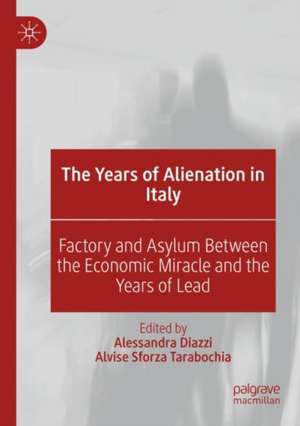The Years of Alienation in Italy: Factory and Asylum Between the Economic Miracle and the Years of Lead
Editat de Alessandra Diazzi, Alvise Sforza Tarabochiaen Limba Engleză Paperback – 14 aug 2020
| Toate formatele și edițiile | Preț | Express |
|---|---|---|
| Paperback (1) | 384.31 lei 6-8 săpt. | |
| Springer International Publishing – 14 aug 2020 | 384.31 lei 6-8 săpt. | |
| Hardback (1) | 390.63 lei 6-8 săpt. | |
| Springer International Publishing – 19 iun 2019 | 390.63 lei 6-8 săpt. |
Preț: 384.31 lei
Nou
Puncte Express: 576
Preț estimativ în valută:
73.53€ • 76.78$ • 60.72£
73.53€ • 76.78$ • 60.72£
Carte tipărită la comandă
Livrare economică 15-29 aprilie
Preluare comenzi: 021 569.72.76
Specificații
ISBN-13: 9783030151522
ISBN-10: 3030151522
Pagini: 248
Ilustrații: XIX, 248 p.
Dimensiuni: 148 x 210 mm
Greutate: 0.33 kg
Ediția:1st ed. 2019
Editura: Springer International Publishing
Colecția Palgrave Macmillan
Locul publicării:Cham, Switzerland
ISBN-10: 3030151522
Pagini: 248
Ilustrații: XIX, 248 p.
Dimensiuni: 148 x 210 mm
Greutate: 0.33 kg
Ediția:1st ed. 2019
Editura: Springer International Publishing
Colecția Palgrave Macmillan
Locul publicării:Cham, Switzerland
Cuprins
1. Introduction: Social and Mental Alienation in Italy between the Economic Miracle and the Years of Lead.- Part I. Spaces of Alienation.- 2. Into the De/Construction of the Psychiatric Space.- 3. Doctor in Slaughter: Emilio De Rossignoli’s Dialectic of Enlightenment.- Part II. Workers at Olivetti.- 4. Volponi-Ottieri-Olivetti and the Ills of Homo industrialis: Returning to a ‘Civiltà della natura’ as a Questionable Antidote to the Urban-Industrial Malaise.- 5. “Sentirsi Scorticati Vivi”: The Theme of Alienation in Ottiero Ottieri’s Works.- 6. Paolo Volponi’s Memoriale: Industry between Alienation and Utopia.- Part III. Psychoanalysis and Alienation.- 7. Alienation and Psychoanalysis: Some Notes on Italy in the Years of the Economic Miracle.- 8. Psychoanalysis in Milan in the Age of Dis-alienation: The Case of Elvio Fachinelli.- 9. From the Factory to the Asylum…and Back: A Lacanian Perspective on the Cinematic Representation of Alienation in Elio Petri’s La classe operaia va in paradiso.- Part IV. The Asylum.- 10. Manicomiche: Madness, Language and the Dismantling of the Asylum in Gianni Celati’s Comiche.- 11. Mental Social, and Visual Alienation in D’Alessandro’s Photography.- 12. ‘L’alienato nella cella è libero.’ Mario Tobino between Le libere donne di Magliano and Per le antiche scale.
Recenzii
“As a total contribution to the cultural history of the economic boom, this volume is a welcome, successful, and impressive accomplishment.” (Jim Carter, Italian Studies, November 22, 2019)
Notă biografică
Alessandra Diazzi is Lecturer in Italian at the University of Manchester, UK. Her work focuses primarily on the reception of psychoanalysis in Italian culture, with a particular focus on the relationship between psychoanalysis and impegno in Italy. She has published articles on contemporary Italian literature and cinema.
Alvise Sforza Tarabochia is Lecturer in Italian at the University of Kent, UK. His research encompasses visual culture and psychiatry in Italy. He has published a monograph on the theoretical implications of Basaglia’s thought, as well as articles on Italian literature, biopolitics, visual culture, and psychoanalysis.
Alvise Sforza Tarabochia is Lecturer in Italian at the University of Kent, UK. His research encompasses visual culture and psychiatry in Italy. He has published a monograph on the theoretical implications of Basaglia’s thought, as well as articles on Italian literature, biopolitics, visual culture, and psychoanalysis.
Textul de pe ultima copertă
The Years of Alienation in Italy offers an interdisciplinary overview of the socio-political, psychological, philosophical, and cultural meanings that the notion of alienation took on in Italy between the 1960s and the 1970s. It addresses alienation as a social condition of estrangement, caused by the capitalist system, a pathological state of the mind and an ontological condition of subjectivity. Contributors to the edited volume explore the pervasive influence this multifarious concept had on literature, cinema, architecture, and photography in Italy. The collection also theoretically reassesses the notion of alienation from a novel perspective, employing Italy as a paradigmatic case study in its pioneering role in the revolution of mental health care and factory work during these two decades.
Alessandra Diazzi is Lecturer in Italian at the University of Manchester, UK. Her work focuses primarily on the reception of psychoanalysis in Italian culture, with a particular focus on the relationship between psychoanalysis and impegno in Italy. She has published articles on contemporary Italian literature and cinema.
Alvise Sforza Tarabochia is Lecturer in Italian at the University of Kent, UK. His research encompasses visual culture and psychiatry in Italy. He has published a monograph on the theoretical implications of Basaglia’s thought, as well as articles on Italian literature, biopolitics, visual culture and psychoanalysis.
Alessandra Diazzi is Lecturer in Italian at the University of Manchester, UK. Her work focuses primarily on the reception of psychoanalysis in Italian culture, with a particular focus on the relationship between psychoanalysis and impegno in Italy. She has published articles on contemporary Italian literature and cinema.
Alvise Sforza Tarabochia is Lecturer in Italian at the University of Kent, UK. His research encompasses visual culture and psychiatry in Italy. He has published a monograph on the theoretical implications of Basaglia’s thought, as well as articles on Italian literature, biopolitics, visual culture and psychoanalysis.
Caracteristici
Addresses for the first time, from an interdisciplinary perspective informed by cultural studies, the political and cultural meaning(s) the notion of alienation took in Italy, taking the national context as a paradigmatic case study Tackles the long-lasting debate on Italian asylums from a novel perspective, proposing to read this revolution in the light of a broader social, cultural, and above all political debate on personal freedom and social control Relates the representation of alienation in this Italian period to broader theories of the concept across media, time periods, and geography
